
Chronology
History of Naples - Click here
|
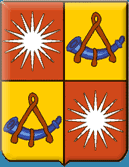 |
Genealogy
Maison
del Balzo/des Baux
(click here) |
ANCIENT
NAPLES ( 900 BC - 325 AD )
Naples lies at the focal point between the fertile area of the Campania
and the Bay of Naples
The earliest history is shrouded in legend , the first settlement was
probably in the 9th Century BC by Merchants from Achaean Greeks who
used the area as trade foothold.
By the 7th Century BC Greek colonists from Rhodes established a permanent
city named Parthenope after one of the legendary Sirens who had tempted
Odysseus.
In the 6th Century BC Parthenope was a busy trade and military port
, in competition with Cumae , settled by Greek from Chalcis.
Incursions of Etruscans from Northern Italy left Parthenope weakened
and in 550 BC the city was taken by the neighboring Cumaeans.
Around 474 BC , Greeks from Syracuse founded next to the site of
Parthenope a new city "Neapolis", in 450 BC Neapolis attracted
new Greeks from Chalcis , Pithecusa and Athens.
Neapolis remained a true Greek City , part of Magna Graecia.
The Samnites ,Italic Tribe from the Apennines took both Campania and
the City in 400 BC.
In 326 BC , Neapolis fell to the Latins Romans who incorporated
the territory into its confederation.
Naples and its environs remained a center of Greek Civilisation
and for Rome eager for the Culture of the East , a magnet for artists
and patrons of the Arts.
Romans patricians such as Lucullus and Emperors Augustus and Tiberius
spent much of their time in the area.
The Social wars , in which Naples sided Sulla in 82 BC against Mario
, brought the sacking of the city, and it started its shift from a life
based on Trade to a leisure Capital of the Roman Aristocracy of the
late Republic and Empire.
In the 4th Century AD , the city role declined as Constantine moved
the imperial Court to Constantinople , Naples fell into a slow economic
slump and is literally the scene of the decline of tha Roman Empire.
Romulus Augustulus , last Western Roman Emperor , died (476 AD )as prisoner
of Odoacer Chief of the Herulians Barbarians.
EARLY BYZANTINE NAPLES (325-568)
Naples was one of the earliest parts of Europe to feel the Christianity
, St Paul arrived in Pozzuoli on his way to Rome , many catacombs testify
that was an important center of Christian Culture and Art.
In 401 Alaric from the royal House of Balthas chief of the Visigoths
(Germanic Tribes West of the Black Sea) ivaded Italy , ravaged Venetia.
In 410 after the Sack of Rome passed through Naples bringing destruction.
In 455 Gaiseric Chief of the Vandals took over again Rome and Naples.
By 490 the most of Italy fell under the Rule of Theodoric Chief
of the Ostrogoths ( Germanic Tribes east of the Black Sea).
The Emperor Justinian (Constantinople Roman Emperor) as part of
his grandiose reconstitution of the Roman Empire , dispatched a brilliant
General : Belisarius and later Narses capable and cruel; they launched
the reconquest (535-554) of southern and central Italy and drove the
Germanic invaders over the Alps.
In 554 Justinian's Pragmatic Sanction restored the Italian lands
taken by the Ostrogoths and made a restoration of Government , but agricultural
lands were depopoulated and grown into wilderness , towns declined.
"Duces" were appointed , probably over each "Civitas"
, as part of the Imperial Administration , a fusion of the ducal title
and landowonership favoured a new class of hereditary military proprietors.
Totila the new Gothic King (541-552) recaptured Rome and Naples
despite Belisarius and Narses return.
The city of Naples remained under Gothic control.
Rome was now a small provincial town , despite Constantinople had
taken Southern Italy , the way was open to the Lombards , a tribe from
eastern Germany , under King Alboin, who invaded the South in 568.
DUKEDOM (568 - 1130 )
The Lombards decided to divide the new Kingdom in Italy in 36 "Lombard
Dukes".
They were not numerous enough to occupy the whole peninsula , Rome and
Naples were
never held.
The peninsula was a mosaic of Byzantine , papal and Lombard jurisdictions:
Pavia the Lombard Capital after 573 , Rome the Papal Capital and Ravenna
the Byzantine Exarchate.
" to be continued"
SOUTH of ITALY at the OPENING OF the 11th CENTURY
The Normans ( Hauteville Dinasty)
Saracens were Rulers of Sicily ; Apulia and Calabria under the feeble
rule of Constantinople; Gaeta , Naples were Independent Byzantine Dukedoms
. Amalfi was a city Republic and Benevento , Capua and Salerno were
Lombard principalities.
The Normans invasion gained a foothold in Aversa (near Naples)
with Tancred of Hauteville.(c.1029).
The Emperor Conrad II the Salian in 1037 restored order in the
south and with his Constitutio de feudis made Italian fiefs hereditary.
The rivalry and the weakness of the local Rulers ,facilitate the
conquest of the Realm by the Normans , taking over Sicily in 1060-1090.
Roger of Hauteville became King of Sicily.
When English-speaking historians mention the Norman Conquest, they
are usually referring to the invasion of England in 1066 by Normans
under the leadership of William the Conqueror. The first Norman Conquest,
however, came in Sicily six years before the more famous invasion of
England.
For the seven sons of Tancred of Hauteville, a minor Norman nobleman,
war was the family business. About 1030 Tancred's two oldest sons, William
and Drago, joined other Normans as mercenaries in southern Italy.
There they served the Pope and his Lombard allies in attempting
to expel the Eastern Roman (Byzantine) Empire--based in Constantinople--from
its remaining outposts in Apulia. William d'Hauteville, for reasons
perhaps suggested by his nickname "Iron Arm," emerged as leader
of the Norman mercenaries.
He assumed the title Count and, through the next decade, brought
most of Apulia under control of his Norman forces.
In later years the d'Hautevilles' personal control over the new
principality was strengthened as William and Drago were joined by their
brothers, especially the two youngest, Robert "Guiscard" (meaning,
"the Resourceful"), who arrived in 1046, and Roger, who joined
his older siblings about 1057.
By 1053 Pope Leo IX realized that by encouraging the Normans to
oust the Byzantines the Papacy had exchanged a weak and harmless enemy
for a powerful and menacing friend. The magnitude of the new problem
was exposed in 1053.
The Pope determined to nip the nascent power of the Normans in
the bud, but the army he sent to achieve that purpose was decisively
defeated in a battle at Civitate. Thereafter the Normans, led by the
two youngest d'Hautevilles, Robert and Roger, rapidly expanded their
power throughout Apulia and added Calabria as well.
Finally, in 1059 Pope Nicholas II made the best of a bad situation
by creating an alliance of sorts with the d'Hautevilles. In exchange
for a nominal commitment of allegiance from the d'Hautevilles, the Pope
formally confirmed Robert's claim not only to Apulia and Calabria, but
to Sicily as well. Sicily, of course, was actually under Saracen rule;
the Pope had in effect granted the Normans a license to conquer the
island.
The d'Hautevilles never declined an opportunity for conquest. After
a preliminary raid led by Roger with mixed results, the d'Hautevilles
launched their invasion of Sicily in 1060--beginning the first Norman
Conquest
The ambition of the Normans under leadership of the d'Hauteville brothers
was fuelled, not sated, by their success in establishing a principality
in southern Italy in the mid-1000s.
As a result, they were eager, with modest encouragement from the
Papacy, to extend their empire to Saracen-ruled Sicily under the banner
of Christendom.
In 1060 the Norman leader Robert Guiscard with his brother Roger
d'Hauteville opened their invasion of Sicily.
The Normans first stormed and captured Messina, that traditional stepping
stone from the Italian mainland into Sicily. In subsequent years, aided
by dissension among the Saracens and supported by elements of the indigenous
Greek population, the Norman invaders fought their way across northern
Sicily.
They captured the Saracen capital of Palermo ten years later, in
1071.
The tide of war in eastern Sicily seesawed back and forth, with
major cities taken and then retaken by the contending forces.
Finally, in 1090 the last Saracen stronghold fell, and the Normans
were left in complete control of the entire island.
The two powerful d'Hauteville brothers demonstrated a skill in governance
that was equal to their skill in warfare. Robert and Roger established
an amicable arrangement between themselves for allocating captured spoils
and dividing power.
That agreement left Robert as ruler of southern Italy and Roger
as ruler of Sicily. Relations in the next generation were less peaceable.
Roger's son, another Roger (who was crowned king of Sicily as Roger
I), weathered an extended period of hostility with various changing
alliances among his mainland cousins, the Papacy and other Italian princes.
Finally he succeeded in uniting Sicily and the d'Hauteville territory
on the mainland into a single powerful kingdom--the Kingdom of Two Sicilies
(Citra Farum and Ultra Farum ).
The Kingdom was called of Sicily and covered Sicily, Calabria,
Apulia, Lucania and Campania, the capital was Palermo.
On the island of Sicily the d'Hautevilles introduced a period of
remarkable tolerance, with even-handed treatment of the Greek and Saracen
populations, who were joined by an increasing migration of new settlers
from the Italian mainland.
The Norman dynasty, however, was to be only a brief interlude before
Sicily became a chip in the high-stakes game of European politics.
Norman Succession in Sicily
The crown of King Roger I (1062 - 1101 ), the first crowned king
of Sicily, passed peaceably to his son William I and grandson William
II.
The Norman Count Roger II of Sicily(1103-1154) succeeded the norman
William Duke of Apulia (1111-1127) and assumed (1130) the Title of King
of Sicily,Apulia and Capua with the approval of anti-Pope Anacletus
II, excommunicated by Pope Innocent II (1139), he defeated Innocent
and took him prisoner and forced the recognition of the Title.
Skillful diplomacy prevented a joint invasion of Sicily by Greek and
Roman Emperors,
William I (1154-1166), continuing Roger's policy defeated (1156)
the Byzantine allies of Pope Adrian IV and compelled Adrian to recognize
his Title in Sicily, Apulia, Naples, Amalfi and Salerno.
William II (1166-1189) planned a Mediterranean empire and wished
a free hand, he welcomed the marriage (1186) of Constance , Roger II'
s daughter, his heiress, to the future Emperor Henry VI.
Tancred of Lecce (1190-1194), son of Roger duke of Apulia and brother
of Constance led a vigorous native resistance to the emperor Henry VI
(King of Sicily 1194-1197) with the support of Papacy and Richard I
of England but Henry reduced Sicily and Southern Italy with the aid
of Genoa and Pisa .The Norman Rule ended with Tancred.
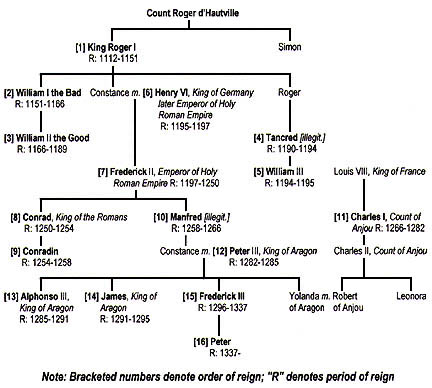
The Norman Kinship in Southern Italy and Sicily was Theocratic
along the lines of the Byzantine Heritage; the administration was efficient
, prosperity and balanced taxation made the Sicilian Monarchs perhaps
the richest in Europe. Dealing with a cosmopolitan Kingdom containing
Italian, Greek and Saracen elements , the Norman Rulers practiced a
tolerant eclecticism which provided for a wide racial divergences in
law , religion and culture.
THE HOHENSTAUFENS from SWABIA
(1194-1268)
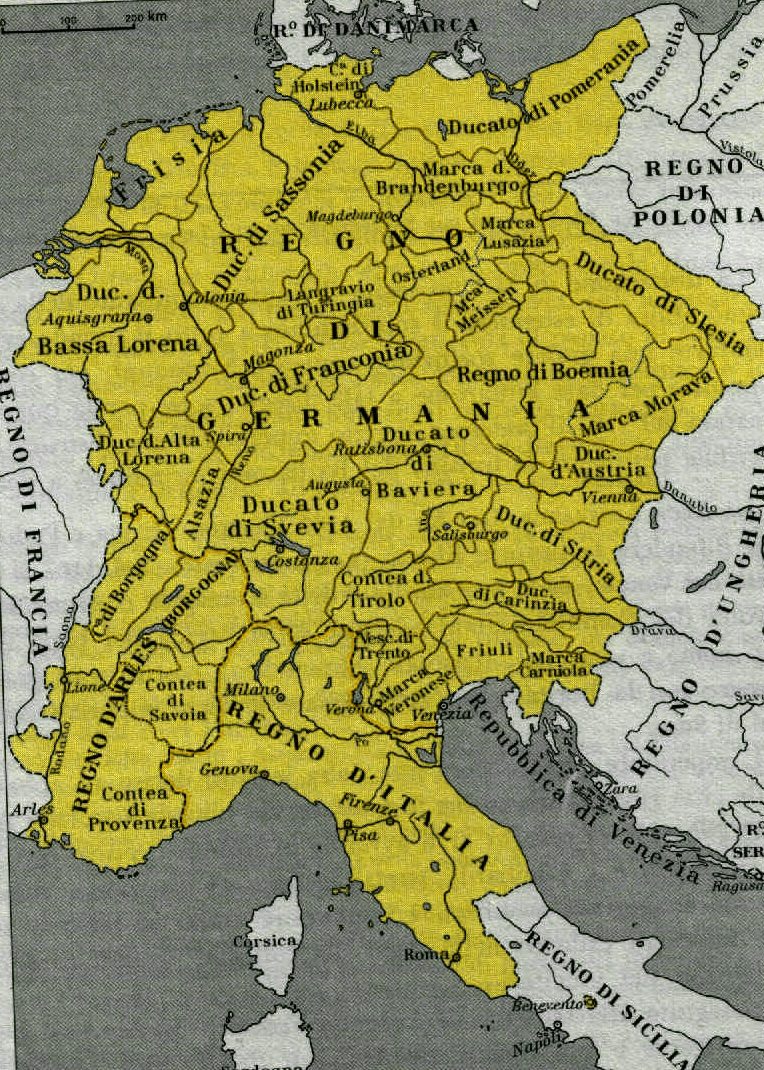
Reign of Frederick II of Hohenstaufen (1198-1250)
Henry VI plans to unite the German and the Sicilian Crowns , and to
crown Frederick without election, were blocked by powerful German and
Papal opposition.
Frederick was elected King of the Romans (1196). Plans for the foundations
of a Mediterranean Empire( traditional with the Norman Kings of Sicily)
on the ruins of the Byzantine Empire as the basis for an universal dominion.
Sicilian outbreak against the German administration was brutally crushed
and a bitter anti-imperial reaction in Italy and a long civil war in
Germany followed Henry's sudden death.
The Civil war in Germany (1197-1212) generated chaos in the Empire
, two rival Kings : Philip of Swabia (Henry's brother ) and the Welf
Otto of Brunswick challenged the imperial succession.
The German nobles played one side off against the other. Chaos in Sicily,
assassination of
Philip (1208), imperial coronation of Otto (1209 ), Papal break ( Innocent
III ) with Otto and support of Frederick , second election of Frederick
to the Empire ( 1211 ) and dash to Germany.
Frederick II ( 1212 -1250 ) " Stupor Mundi" , charming
, pitiless and arrogant , one of the Most of brilliant ruler and learned
men of his days, a great legislator , diplomat , skeptic and a leading
scientific investigator of his times , Sicilian by taste and culture
, half Norman by blood was crowned King of Sicily in 1198 , King of
the Romans in 1212 , King of the Germans at Aachen in 1215 , Emperor
at Rome in 1220 .
The main guide-lines of the reorganization of the Kingdom were :
clean sweep of private Titles and Royal privileges in the Norman manner
; resumption of Royal Domain ; destruction of private garrison and feudal
Castles ; ban on private war ,criminal jurisdiction transferred from
Feudal to Royal Courts ; clergy taxed and excluded from civil office.
Local rising and unrest in Southern Italy ( 1228- 1230 ).
The Constitutions of Melfi ( 1231 )
The most constructive "Legislation" in the Middle Ages (partially
a continuation of Roger II and influenced by Roman Law) : ( Centralized
and efficient bureaucrazy ; clerical jurisdiction limited to ecclesiastical
matters ; simony in civil office a criminal offense and careful financial
organisation ).
He founded the University of Naples ( first in Europe on Royal
Charter ) 1224 and the school of medicine in Salerno . The advance economic
policy based on Arab practice , abolition of internal tools, mercantilistic
regulation , replacement of Feudal dues by fixed payments and efficient
custom collection made his ruling one of the most prosperous in the
Middle Ages.
In 1250 Frederick II died after a lingering illness.His enemies regrouped
to seek revenge.
In 1251 Naples rose , formed a free commune ; Conrad IV son of Frederick
, was absent fighting his war in Germany , his illegitimate son Manfred
became Balio , or Regent , for the Regno and the Hohestaufens holdings
in the North .
Pope Innocent IV (S.Fieschi) (1243-1254) , hoped to crush the Hohenstaufens
in both Germany and Italy and raised candidates among European Royal
Families to replace them . Conrad IV reached immediately Naples to consolidate
his power .
The Emperor Frederick II is a very convenient example of the sort
of doubter and rebel the thirteenth century could produce.
It may be interesting to tell a little of this intelligent and cynical
man. He was the son of the German Emperor, Henry VI, and grandson of
Frederick Barbarossa, and his mother was the daughter of Roger I, the
Norman King of Sicily.
He inherited this kingdom in 1198, when he was four years old; his
mother was his guardian for six months, and when she died, Pope Innocent
III (1198 to 1216) became regent and guardian. He seems to have had
an exceptionally good and remarkably mixed education, and his accomplishments
earned him the flattering title of "Stupor Mundi", the amazement
of the world.
The result of getting an Arabic -view of Christianity, and a Christian
view of Islam, was to make him believe that all religions were impostures,
a view held perhaps by many a stifled observer in the Age of Faith.
But he talked about his views; his blasphemies and heresies are on record.
Growing up under the arrogant rule of Innocent III, who never seems
to have realized that his ward had come of age, he developed a slightly
humorous evasiveness. It was the papal policy to prevent any fresh coalescence
of the power of Germany and Italy, and it was equally Frederick's determination
to get whatever he could. When presently opportunity offered him the
imperial crown of Germany, he secured the Pope's support by agreeing,
if he were elected, to relinquish his possessions in Sicily and South
Italy, and to put down heresy in Germany.
For Innocent III was one of the great persecuting Popes, an able,
grasping, and aggressive man. (For a Pope, he was exceptionally young.
He became Pope at thirty-seven.) It was Innocent who had preached a
cruel crusade against the heretics in the south of France, a crusade
that presently became a looting expedition beyond his control.
So soon as Frederick was elected emperor (1211), Innocent pressed
for the, performance of the vows and promises he had wrung from his
dutiful ward. The clergy were to be free from lay jurisdiction and from
taxation, and exemplary cruelties were to be practised upon the heretics.
None of which things Frederick did.
He liked Sicily as a place of residence better than be liked Germany.
Innocent III died baffled in 1216, and his successor, Honorius III,
effected nothing. Honorius was succeeded by Gregory IX (1227), who evidently
came to the papal throne with a nervous resolution to master this perplexing
young man.
He excommunicated him at once for failing to start upon his crusade,
which was now twelve years overdue; and he denounced his vices, heresies,
and general offences in a public letter (1227).
To this Frederick replied in a far abler document addressed to all
the princes of Europe, a document of extreme importance in history,
because it is the first clear statement of the issue between the pretensions
of the Pope to be absolute ruler of all Christendom, and the claims
of the secular rulers.
This, conflict had always been smouldering; it had broken out here
in one form, and there in another; but now Frederick put it in clear
general terms upon which men could combine together.
Having delivered this blow, be departed upon the pacific crusade of
which we have already told. In 1239, Gregory IX was excommunicating
him for a second time, and renewing that warfare of public abuse in
which the papacy had already suffered severely. The controversy was
revived after Gregory IX was dead, when Innocent IV was Pope; and again
a devastating letter, which men were bound to remember, was written
by Frederick against the church. He denounced the pride and irreligion
of the clergy, and ascribed all the corruptions of the time to their
pride and wealth. He proposed to his fellow princes a general confiscation
of church property-for the good of the church. It was a suggestion that
never afterwards left the imagination of the European princes.
He never gave up of Sicily!
It is possible to piece together something of his court, life in Sicily.
He is described towards the end of his life as "red, bald,
and short-sighted"; but his features were good and pleasing.
He was luxurious in his way of living, and fond of beautiful thing.
He is described as licentious. But it is clear that his mind was not
satisfied by religious scepticism, and that be was a man of very effectual
curiosity and inquiry. He gathered Jewish and Moslem as well as Christian
philosophers at his court, and he did much to irrigate the Italian mind
with Saracenic influences.
Through him Arabic numerals and algebra were introduced to. Christian
students, and among other philosophers at his court was Michael Scott,
who translated portions of Aristotle and the commentaries thereon of
the great Arab philosopher Averroes (of Cordoba).
In 1224 Frederick founded the University of Naples, and he enlarged
and enriched the great medical school at Salerno University, the most
ancient of universities. He also founded a zoological garden. He left
a book on hawking, which shows him to have been an acute observer of
the habits of birds, and he was one of the first Italians to write Italian
verse. Italian poetry was indeed born at his court. He has been called
by an able writer, "the first of the moderns," and the phrase
expresses aptly the unprejudiced detachment of his intellectual side.
His was an all-round originality. During a gold shortage he introduced
and made a success of a coinage of stamped leather, bearing his, promise
to pay in gold, a sort of leather bank-note issue.
In spite of the torrent of abuse and calumny in which Frederick was
drenched, he left a profound impression upon the popular imagination.
He is still remembered in South Italy almost as vividly as is Napoleon
I by the peasants of France; he is the "Gran Federigo." And
German scholars declare that, in spite of Frederick's manifest dislike
for Germany, it is he, and not Frederick I, Frederick Barbarossa, to
whom that German legend originally attached-that legend which represents
a great monarch slumbering in a deep cavern, his beard grown round a
stone table, against a day of awakening when the world will be restored
by him from an extremity of disorder to peace. Afterwards, it seems,
the story was transferred to the Crusader Barbarossa, the grandfather
of Frederick II.
A difficult child was Frederick II for Mother Church, and he was only
the precursor of many such difficult children. The princes and educated
gentlemen throughout Europe read his letters and discussed them. The
more enterprising university students found, marked, and digested the
Arabic Aristotle he had made accessible to them in Latin. Salerno cast
a baleful light upon Rome. All sorts of men must have been impressed
by the futility of the excommunications and interdicts that were levelled
at Frederick.
The Pope therefore looked for some candidate willing to depose the
" heretics " by force of arms ( he offered the Sicilian Crown
under Papal suzerainty to Edmund son of Henry III of England ); Henry
III of England immediately backed an invasion force with cash ; and
with Conrad's IV death in 1254 , shortly after his capturing of Naples
, Innocent IV entered the Regno with his young charge Conrad V ( Conradin
) as a figurehead for his plans to annex the South to the Papal State.
However Manfred was able to rally the Hohenstaufen forces ; Conradin
had defected to him , and in 1258 Manfred had himself crowned King of
Sicily.
The papal " crusade" aganst the Hohenstaufens continued
to embroil the entire peninsula.
With the accession of King Louis IX's of France former Chancellor as
pope Clement IV (G.Foulquois) ,the original papal candidate for the
throne rose again ; Charles of Anjou , Louis' and ruthless younger brother
, Count of Provence since 1246. He saw now a means of uniting papal
hostility , french resources and his own ambitions to create an Empire
in the Mediterranean. He undertook a crusade and he defeated Manfred
on February 26 1266 in Benevento ending any hope of a native ruler.
In 1268 Conradin aged 15 called from Germany by the Ghibellines
forces was also defeated in Tagliacozzo by Charles , destroyed his army
, massacring the captives.
Conradin brought to Naples was publicly beheaded , an act that shocked
all of Europe and Charles founded the Angevin dinasty in Naples.
The heir of the House of Hohenstaufen was Constance , daughter of
Manfred , whose husband , Pedro III of Aragon , was destined to become
, the first Aragonese King of Sicily ( 1282-1285 ).
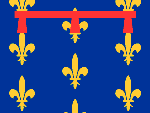
Genealogy House of Anjou-Naples
Click here
Charles of Anjou , now King Charles I ( 1265-1285 ) to efface the
memory of the Hohenstaufen , immediately moved his capital from Palermo
to Naples and began calling his realm Kingdom of Naples ( institutionaly
his title was Rex Siciliae ).
His change was prophetic , on March 30 , 1282 , a conspiracy designed
to end the Angevin ambitions spread throughout the Mediterranean , the
revolt known as the Sicilian Vespers brought the emperor of Bysantium
Michael VIII Paleologus , Pedro III of Aragon together to wrest Sicily
from the Angevins , the twenty- years war , followed the capture of
Charles II ( 1285-1309 ) and the eventual Aragonese control of Sicily.
(Charles of Anjou), 1227-85, king of Naples and Sicily (1266-85), count
of Anjou and Provence, youngest brother of King Louis IX of France.
He took part in Louis's crusades to Egypt (1248) and Tunisia (1270).
After obtaining Provence by marriage (1246), he extended his influence
into Piedmont. He became senator of Rome (1263, 1265-78) and undertook
to champion the Papal cause against Manfred in the kingdom of Naples
and Sicily. In reward, he was crowned king (1266) by Pope Clement IV.
Charles defeated (1266) Manfred at Benevento and defeated and executed
Conradin in 1268. As leader of the Guelphs, or papal faction, he gained
political hegemony in Italy and won suzerainty over several cities in
Tuscany, Piedmont, and Lombardy, but his overbearing policies led to
a cooling of his relations with the papacy.
Planning to establish his own empire, he allied himself with the
deposed Byzantine emperor, Baldwin II, against Michael VIII and fought
for years in the Balkans. Corfu, Epirus, and Albania were taken, but
the crushing taxes necessitated by his wars and his appointment of oppressive
French officials to exact them led to the Sicilian Vespers (1282).
The ensuing war against the Sicilian rebels and Peter III of Aragón,
chosen by the rebels as King of Sicily, continued under Charles's son
and successor, Charles II.
The first Angevin dynasty in Naples was founded.
The Angevin period was one of the international influence , prosperity
and cultural and religious brilliance for Naples.
The Angevin' possessions in Anjou , Provence and Piedmont , created
an immediate surge in the city' s population and trade. Merchants from
Ctalonia , Marseilles , and Florence founded trade emporiums , Bankers
and Investors filled the new section of the City.
Castel Nuovo , soon became the new Royal residence , population reached
40,000.
Charles II ( 1285 - 1309 ) expanded Castel Sant'Elmo and the Certosa
di San Martino.
His wife was Mary ,queen of Hungary.
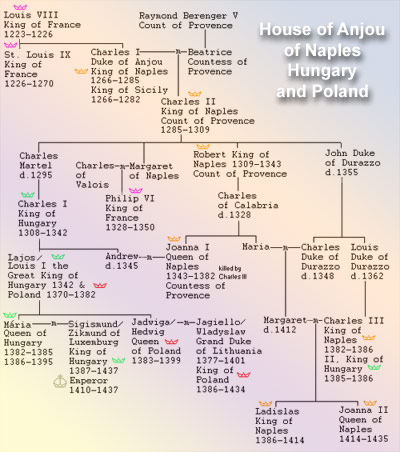
The Angevin Period 1266-1442
Charles I ,of Anjou (1226-1285)
King of Sicily and Naples (1266-1285) , He was the tenth son
of
Louis VIII of France , who left him the County of Anjou as an apanage
.
By his marriage with Beatrice Countess and Heiress of Provence ,
He also became Count of Provence in 1246.
Supporting the economic and maritime policy of Marseilles , he became
involved in Italian politics .
In 1266 as previously said , he was offered the throne of Sicily by
Pope Clement IV (1265-68) Guy Foulcaud and with the consent of his brother
King Luis IX of France.
He fought against Manfred and the Hohenstaufen dynasty, conquered
Sicily and tried to establish a hegemonic Mediterranean Kingdom with
Palermo as its capital, acquiring also succession rights in the Balkans
and the Latin Kingdom of Jerusalem.
Under his influence, Louis IX organized the crusade against
Tunis, where the King died.
Charles policy , instigated an open revolt in Sicily against
the Angevins supported by the Aragonese : the revolt broke out in Sicily
in 1282 and was so named because it erupted at the hour of Vespers.
King Peter III of Aragon was a major supporter , was also a
reaction to the conquest of the Island in 1266 and the fall of the Hohenstaufen
Dynasty , it was led by counsellors and former ministers of King Manfred
, who were faithfully to Constance his daughter wife of Peter III of
Aragon , I of Sicily.
Support of among local population did not materialize , however
until a series of repressive actions taken by Charles , who favoured
The merchants from Provence and he merely used Sicily as source of Royal
revenue.
The Angevins government in the Island fell and Charles effort
to crush the uprising failed , despite the support of the Papacy and
by his nephew Philip III of France .
Peter III was proclaimed King of Sicily , under the conditions
that he administers according to his own laws and as separate Realm.
Charles lost Sicily and moved the capital to Naples , reigning
over the mainland provinces.
Charles II of Anjou-Naples , “ the Lame”
( 1248-1309 )
King of Naples and Count of Provence ( 1285 – 1309 ).
Son of Charles I , he continued his father policy ; he introduced
the French style of government , combining royal autocracy with feudal
organisation of the countryside.
He became influential at Rome and was involved in Papal affairs.
His effort to conquer Sicily led to a long struggle with Aragon
, forcing to accept the loss of Sicily and the peace of Caltabellotta
(1302) separated formally the two Kingdoms.
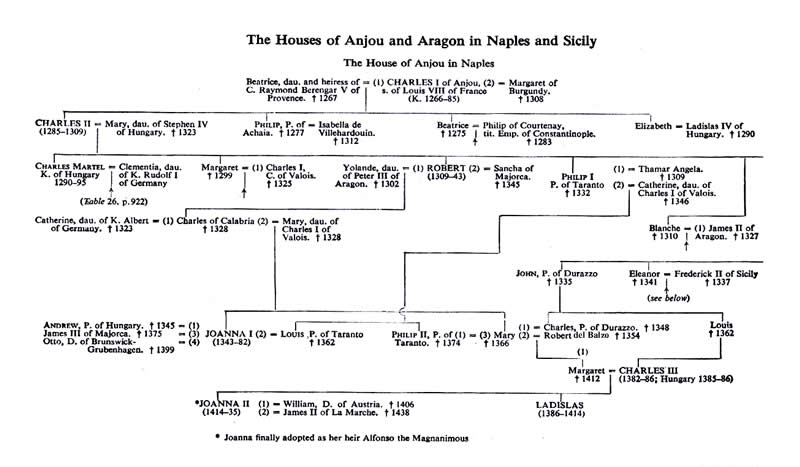
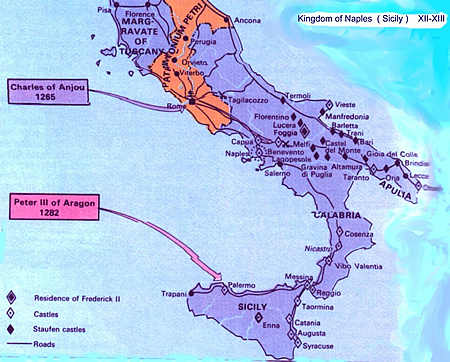
The Aragonese period 1443-1504
Alfonso V
(Alfonso the Magnanimous), 1396-1458, king of Aragón
and Sicily (1416-58) and of Naples (1443-58), Count of Barcelona. He
was the son of Ferdinand I, whom he succeeded in Aragón and Sicily.
Queen Joanna II of Naples sought his aid against Louis III,
rival king of Naples, and, after Alfonso had defeated (1421) Louis,
Joanna adopted Alfonso as her heir.
They quarrelled in 1423, and when Joanna died (1435), she left
her throne To Rene’ of Anjou. Attempting to conquer Naples, Alfonso
was captured (1435) by the Genoese, but he was released through the
intervention of the Filippo Maria Visconti Duke of Milan.
In 1442 he defeated René, took Naples, and was recognized
(1443) as King by the Pope Eugene IV.
Alfonso's cohorts within the city opened the passage and let
the invaders in. The subsequent sacking and pillaging was atrocious,
but Naples was now rejoined to Sicily, unifying the Kingdom of Two Sicily
for the first time in two hundred years.
Afterwards, Alfonso went back outside so he could enter the
city officially on 26 February 1443 in a golden chariot and sheltered
by a canopy held by 30 disgruntled Neapolitan noblemen.
That entry is memorialized in the Aragonese victory arch over
the entrance to the Maschio Angioino, the Angevin Fortress. It was a
task they did not like, for a king they did not like, at the beginning
of a dynasty they would not like.
Shortly thereafter, Alfonso left his Spanish holdings to his
brother and dedicated himself full-time to his own Aragonese dynasty
in Italy.
Leaving his Spanish possessions under the rule of his wife
and his brother, Alfonso spent the rest of his life in Naples, where
he accorded great privileges to Spanish nobles and tried to introduce
Spanish institutions.
A patron of arts and letters, he held a splendid court and
beautified the city. Alfonso also played a vigorous part in Italian
politics. He left Naples to his Son Ferdinand I and the rest of his
kingdom to his brother John II.
Neapolitans always considered Alfonso a foreigner, particularly
because of his habit of surrounding himself with only his own countrymen
Catalans and Aragonese , giving them the choice positions at court.
Apparently, towards the end of his life he changed his mind
about this and passed on to his natural son Ferdinand or Ferrante the
“Bastard” as enemies called him, a few bits of advice:
Avoid the Spanish, Lower the taxes and keep on good terms with the princes
in Italy, specially the Popes.
Alfonso was regarded as a cultured person; he founded an excellent
library, and artists, poets, philosophers and scholars were an integral
part of his court. In the field with his troops, he lived the same life
as his men and exposed himself to danger in battle with no regard for
his own personal safety.
Alfonso also went among the common people incognito to find
out how things were going.
He liked to listen rather than talk and claimed to be a simple
person, once saying he would have been a hermit if he had had his choice
in life.
Because of his patronage of the arts he became known as Alfonso
the Magnanimous. He also started the total rebuilding of the Angevin
Fortress, fallen into ruin since its completion in the late 1200s; he
paved the streets of the city, cleaned out the swamps and greatly enlarged
the wool industry that had been introduced by the Angevins.
In spite of his pretensions to simplicity, he was addicted
to splendour. At a Neapolitan reception for Frederick III of Germany,
the order of the day to all the artisans in the Kingdom was to give
Frederick's men whatever they wanted and send Alfonso the bill.
Then they all went hunting in the great crater known as the
"Astroni" in the Phlegrean Fields and had a banquet at which
wine flowed down the slopes and into the fountains for the guests.
Parties, however, did not prevent Alfonso, by the time of his
death in 1458, from also having developed the Kingdom of the Two Sicily
into the foremost naval power in the western Mediterranean.
Alfonso's illegitimate son, Ferrante I (1417-1494), succeeded
him in 1459 and in spite of extreme hostility on the part of the feudal
lords in the kingdom, succeeded in strengthening the monarchy at their
expense. He also drove the Angevin fleet from Ischia, their last stronghold
in the area. Ferrante countered baronial hostility most violently.
The great barons hostility , in the Kingdom of Naples has its
remote origin mainly , in the great power that the Aristocracy held
since the Angevin conquest , the feudal system that was established
by the Lombards and Franks and the reluctance of some of the most powerful
Lords to accept the central ruling toward their “ own autonomous states”
, was the last struggle between the feudal Lords and the making of a
modern State.
The Baron Conspiracy was already conceived in 1459 by Marino
Marzano Duke of Sessa and Giovanni Antonio Orsini del Balzo Prince of
Taranto representing John of Anjou as legitimate King ; Ferrante was
defeated in Sarno , but then he recovers in Calabria in 1464 and in
the Battle of Ischia in 1466 , where John of Anjou natural son of the
King Rene’ of Anjou , retender to the throne ,returned in Provence.
In 1485, a renewed conspiracy was supported by the Pope Innocence
VIII (1484-1492) Giovanbattista Cybo, who secretly had aspiration for
his family of feudal possession in the Southern Realm.
The majority of the great Lords took active part: Antonello
Petrucci secretary of the King, Antonello Sanseverino Prince of Salerno
and Francesco Coppola Count of Sarno, were the most important promoters.
The participants were the most relevant feudal families of
the Aragonese period : Pirro del Balzo Prince of Altamura , Piero Guevara
Marquis del Vasto , Girolamo Sanseverino Prince of Bisignano , Matteo
Acquaviva Prince of Teramo , Giovanni Caracciolo Duke of Melfi , Antonio
Centelles Marquis of Crotone , Anghilberto del Balzo Duke of Nardo’,
Giovanni Paolo del Balzo Count of Nola , the Count of Lauria , the Count
of Capaccio , Bernardino Caetani Count of Morcone , Berlinghieri Caldora
, Salvatore Zurlo , Simone Caetani , Gian Francesco Orsini , Traiano
Pappacoda.
The aristocracy was represented in his vast majority from the
old to the most recent ones: Sanseverino as feudal Lords and large estates,
Petrucci as nobility coming from culture, law and knowledge, Coppola
as nobility coming from trade and commerce.
On the 11th August 1486 a peace-agreement was signed by Ferrante
and all Barons, amnesty was granted, to confirm the agreement Ferrante
offered to marry his niece with the son of Francesco Coppola Count of
Sarno. On the day of the wedding most of the Barons were arrested and
executed. The consequence was a continuous struggle during the all period
of his reign. Ferrante main objective, was to show the barons that feudalism
was truly dead he made a lot of them dead, by doing things such as inviting
them and then arresting, jailing and executing a number of them.
Some were fed to the crocodiles which prowled the waters of
the moat. (A skeleton of one such reptile hung over the arch in the
Castle until quite recently.) He even mummified some of his late enemies
and kept them on display in the dungeon of the Castelnuovo (the alternate
name for the Maschio Angioino, meaning, simply "New Castle",
thus distinguishing it from the older Castel dell'Ovo, the Egg Castle).
A sigh of relief went up from the landholding class when Ferrante
died in 1494 after 28 years on the throne. It had been a time of intrigue
which included on-again / off-again relations with the Church and even
a short-lived treaty with the feared Turks who were raiding up and down
the Italian coasts. The point of the treaty had been to warn the rest
of Italy to the north not to take the Kingdom of Naples for granted.
(The Ottoman Turks had just overrun the Byzantine Empire and were threatening
Rome, itself.)
The French reappeared with designs on the throne of Naples.
Under Ferrante's successor, Neapolitan resistance to the French was
utterly ineffective and the French, under Charles VIII, took the city
virtually unopposed; indeed, they were welcomed by most of the nobility,
who sensed a chance to recoup their losses. Their toadying didn't work.
The French pillaged the city, anyway, and dispossessed a number of the
nobles. Charles, however, suddenly found himself cut off: The Papal
State, Milano, and Venice —which had just let Charles pass through unhindered
on the way to Naples— suddenly formed an alliance behind and against
him. Charles had to fight his way back home, attempting along the way,
and failing, to bribe the Pope into crowning him King of Naples. The
jibe by historians is that the French brought two things back from their
Italian campaign: the Renaissance and syphilis, one of which history
has dubbed morbus gallicus in their honour. The Neapolitans always claim
that he was “a mal franzoso “, naturally was originated in the Americas.
France then tried something else: the proposal of an Alliance
to Ferdinand of Spain against Spain's own Aragonese relatives in Naples,
by virtue of which the Kingdom of Two Sicily would cease to exist and
be divided between Ferdinand and Charles. This would effectively give
them both one less rival realm in the area, as well as squelch the heresy
that it wasn't nice to carve up one's own cousins. Ferdinand went for
it and even Machiavelli, himself, later said that Ferdinand had certainly
needed no lessons from anyone in ruthless princemanship. The pact of
Granada was signed on 11 November 1500; the Kingdom was to be divided,
with the capital, Naples, going to France. The French re-entered Naples
in July 1501. It now seemed, however, that both France and Spain had
had their fingers crossed at the signing of the original treaty, so
they had a war over it and Spain won. In May 1504 Spanish troops evicted
the French and entered Naples, ending the Aragonese dynasty, and the
Kingdom, intact, became a colony of Spain.
Naples was now no longer the capital of its own realm. In a
few year's time, with Charles V of Spain crowned Holy Roman Emperor,
heir to the Caesars and Charlemagne, it would be part of an empire,
as it had been more than a thousand years earlier. True, the East had
fallen and what was left of Christian Empire was all in the West; but
after 1492, 'West' meant something monumentally different in human history.
The Empire had shifted, spreading from Europe to the Americas and on
to the Pacific. The age of Empires on which "the sun never sets"
had arrived.
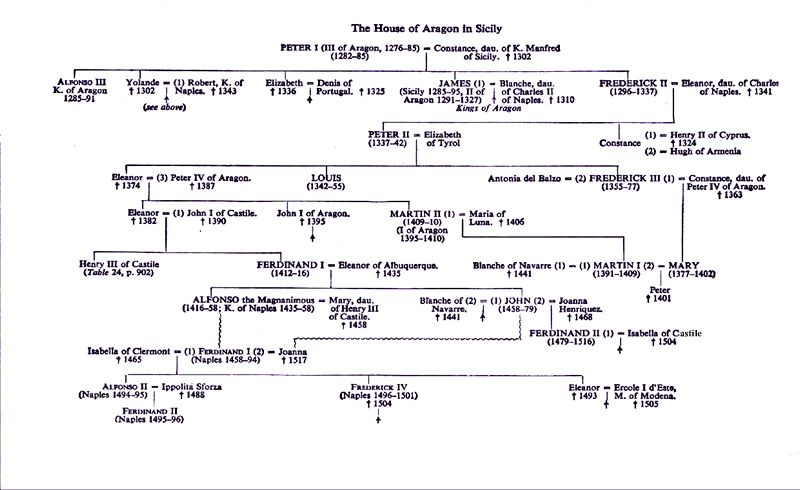
House of Castile-Aragon-Sicily-Naples
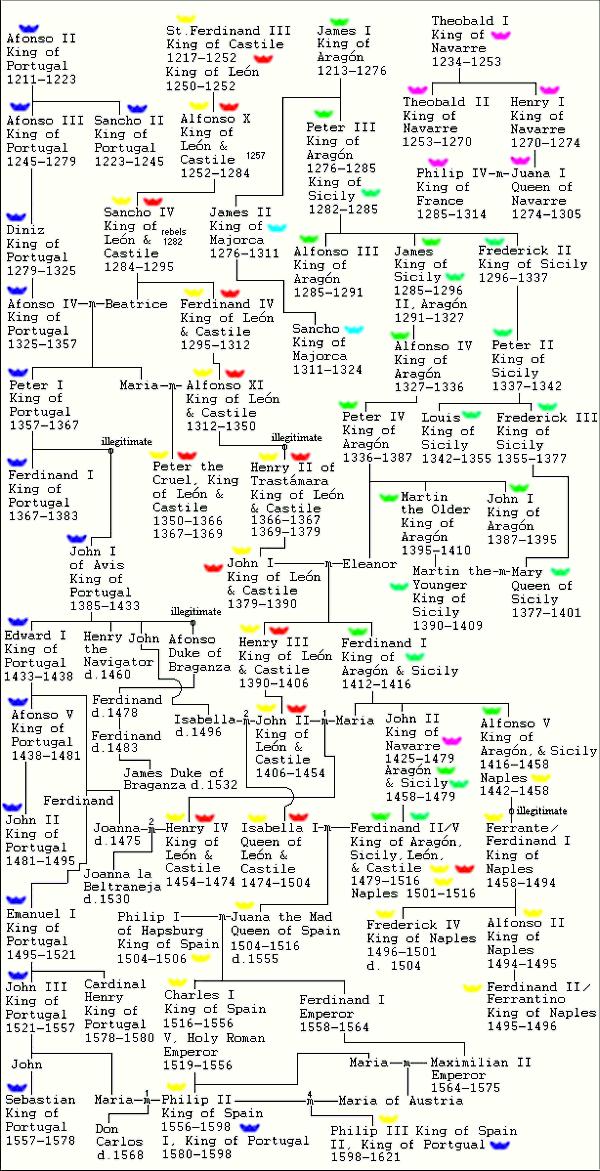
+++ TO BE CONTINUED ++++++ Copyright G.del Balzo
2001
|